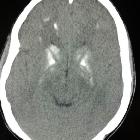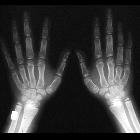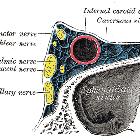Brain stone
Brain stones, also known as cerebral calculi, refers to large intracranial calcifications that may be solitary or multiple.
Clinical presentation
If symptomatic, patients most commonly present with seizures.
Pathology
Localization of brain stones can help narrow the underlying etiology but the causes are numerous :
- intra-axial
- calcifying tumors, e.g. oligodendrogliomas
- vascular, e.g. cavernous malformations, arteriovenous malformations, aneurysms
- infectious, e.g. congenital TORCH infections, tuberculosis, neurocysticercosis
- congenital, e.g. Sturge-Weber syndrome, tuberous sclerosis, intracranial lipomas
- metabolic, e.g. Fahr disease, hyper/hypoparathyroidism, pseudohypoparathyroidism
- extra-axial
- meningiomas
- dural osteomas
- calcifying tumors, e.g. craniopharyngiomas
- intra- or extra-axial
See also
Siehe auch:
- zerebrale Verkalkungen
- Morbus Fahr
- Arteria vertebralis
- Hirnabszess
- Neurozystizerkose
- Sturge-Weber-Krabbe-Syndrom
- zerebrale arteriovenöse Malformation
- Neurotoxoplasmose
- Sinus cavernosus
- Morbus Hippel-Lindau
- haematoma
- TORCH
- Pseudohypoparathyreoidismus
- periventrikuläre Verkalkungen
- mineralisierende Mikroangiopathie
- metastatic calcification in the brain
- normale intrakranielle Verkalkungen
- Eisenablagerungen im Gehirn
- zerebrale Verkalkungen im MRT
- cerebral coccidiomycosis
- Hypoparathyreoidismus
- intramurales Hämatom der Aorta
- intrakranielle Arteriosklerose
- Verkalkungen Kleinhirn
- kongenitale zerebrale Toxoplasmose
- verkalkte zerebrale Embolien

 Assoziationen und Differentialdiagnosen zu Cerebral calculi:
Assoziationen und Differentialdiagnosen zu Cerebral calculi:


















